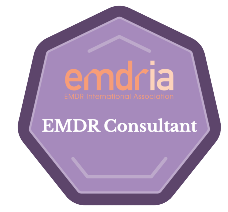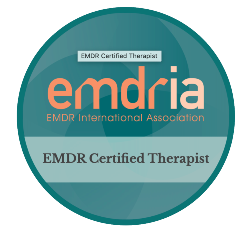EMDR THERAPY IN DENVER
Discover Deep Healing
Get Started

Expert Denver EMDR Therapy for Trauma, Anxiety, & More
Do you experience depression, anxiety, grief, or trauma? Are you struggling to work through painful emotions?
EMDR therapy, or Eye Movement Desensitization and Reprocessing, is an evidence-based therapeutic approach that can help you resolve these experiences — and so many more. EMDR therapy is a cornerstone of our practice at Greenwood Counseling Center because it is an evidence based therapy that alleviates trauma and other mental health challenges. Our experienced EMDR therapists are here to help you free yourself from the traumas and issues that are holding you back from the happiness you deserve.
What Is EMDR Therapy?
EMDR therapy is an evidence-based therapy that combines imagery, mindfulness, and cognitive techniques to help the client process stressful or painful life experiences. It is often used to treat trauma and anxiety, but it can help resolve many other mental health conditions as well.

How EMDR Therapy Helps
Injuries and traumatic events can create emotions and responses that are difficult to cope with. You may start to notice that you are:
- Struggling to sleep
- Experiencing frequent triggers that interrupt their daily lives
- Fearing that an episode can arise at any time
- Suffering through a revolving door of anxiety, uneasiness, and trauma.
- Hypervigilance
- Feelings of numbness
- Intrusive thoughts
- Heightened sadness recalling the traumatic event
If you have experienced any of the above, our PTSD therapy in Denver can help you live a fuller, happier life for yourself and your family.
Benefits of EMDR Therapy
Our founder has practiced EMDR therapy since 2003. In that time, we’ve helped many people gain greater mindfulness and an improved perspective on traumatic and painful memories. We approach our Denver EMDR therapy with:
What To Expect From Your EMDR Therapy
The process of doing EMDR therapy usually involves focusing on a traumatic or disturbing memory while doing back-and-forth eye movements, listening to alternating tones, and/or feeling alternating vibrations in your hands. This enables the brain to resolve emotional trauma and gain insight into the circumstance in a way that is often more effective than traditional talk therapy.
How we approach EMDR therapy will vary slightly based on your circumstances and history. That said, our skilled therapists will typically guide you through eight EMDR phases, which include:

-
Getting Your History: The therapist starts by getting your background. During this phase, we look at the areas you would like to address with EMDR therapy and learn more about the foundation of your experiences.
-
Preparing for EMDR Therapy: During this phase of the therapy, we teach you coping skills and build on your strengths and resources. We prepare you for the EMDR reprocessing so that it progresses most efficiently.
-
Setting Up the EMDR Target: Once we know which issues you’d like to address, we will set up the “target” (the issue that we will focus on) for reprocessing.
-
EMDR Desensitization: We reprocess the target using eye movements until there is no longer any disturbance associated with it.
-
EMDR Installation: We will continue to use eye movements after reprocessing the disturbance associated with the memory, but at this point will be focusing on your positive belief and adaptive perspective.
-
EMDR Body Scan: EMDR Body Scan: Your therapist will bring your attention to your whole body to determine if there is any residual disturbance.
-
EMDR Closure: Your therapist will help you to integrate the new adaptive perspective into your day-to-day life.
-
EMDR Re-Evaluation: At subsequent sessions, we re-assess the treatment effects from the previous session to make sure that they have been sustained or to assess where we need to resume the work.
Find the Right Fit at Greenwood Counseling Center
Finding a therapist you connect with and trust can feel overwhelming. At Greenwood Counseling Center, our skilled therapists are fully committed to your transformation.
We bring expertise, empathy, and compassion to create a safe space for you to process trauma, pain, and other mental health challenges — and find relief on the other side. We’ve helped thousands of people grow stronger after trauma. We can help you, too.
Contact Greenwood Counseling Center today to schedule your free, 15-minute consultation. We’ll help match you with one of our EMDR therapists to start your journey to your best self.
EMDR Therapy FAQs
If you’re a new client, you can schedule a free consultation by filling out the form on our contact page or by calling us at (303) 221-1272. Consultations help us understand your concerns and desires and match you with a therapist who is the best fit.
Current clients can schedule appointments here.
We do not accept insurance, which means you will pay for our therapy yourself. However, your insurance may be able to reimburse you. Call us at (303) 221-1272 or fill out this form so we can discuss your specific situation.
We accept Visa, MasterCard, Discover Card, checks, and cash as forms of payment. Your payment will be due at the time of your session(s).
The number of sessions required for this form of treatment varies depending on the issues being addressed.
If there is a single traumatic incident that is the subject of the Eye Movement Desensitization and Reprocessing, then it can typically be resolved in five or six sessions, including the intake and preparation. However, for multiple traumas or a long history of past abuse, trauma or neglect, this type of therapy can take considerably longer for resolution of the issues.
In our experience with EMDR treatment, the resolution is more complete and longer-lasting than other forms of therapy as we can address the root of the problem, any current triggers associated with the problem and we also may work on future scenarios that may be creating anticipatory anxiety.
Eye Movement Desensitization and Reprocessing Therapy is used with children, teens and adults for Post Traumatic Stress Disorder (PTSD) treatment, depression treatment, anxiety counseling, grief counseling, dependence counseling, work through painful emotions, and so much more.
There are many myths about EMDR therapy, and the duration of treatment is often one of those misunderstandings. The length of time to go through the eight phases of EMDR varies. In rare cases, you could potentially get through the eight phases from start to finish in just a few sessions for one target.
It is advisable to spend time initially in the therapy developing trust and comfort in the therapeutic relationship and making sure your therapist understands your history and goals for treatment.
For each target it can vary for the length of time it takes to reprocess it. Sometimes it takes several sessions to process a target and sometimes it only takes one session before we can move on to the next target.
Your therapist will be teaching you coping skills during the early phases of treatment. If you practice your coping skills in between sessions, it will increase your ability to process through the targets most effectively, expediting the treatment.
EMDR does involve some talk therapy. The time spent listening to your history and getting to know you is very important. Even after we have begun the processing of memories, some clients like to have two or three sessions that are focused on EMDR therapy and then spend a session just wanting to talk. Talk therapy cultivates trust and insight that is helpful when integrated into the EMDR therapy. It is not eliminated from the sessions, but integrated in a different way.
EMDR was initially designed to treat trauma, however, since the early days of its development, it has been effectively used to treat anxiety, depression, grief, addictions, low self-esteem, complex trauma, and more.
EMDR therapists are trained to screen clients to make sure they have adequate coping skills prior to beginning EMDR. If necessary, therapists will teach you more coping skills to help manage the symptoms of PTSD prior to beginning EMDR.
Sometimes EMDR therapy can be upsetting when you are thinking about painful memories in the reprocessing, but your therapist is right there with you, helping you to feel safe, helping you to regulate your emotions, and helping you to reorient to your coping skills prior to leaving the session.
As the saying goes, “the only way out, is often through” the memory. Your therapist is there to help you through the tough stuff and to help you strengthen the insights you have gained.
EMDR won’t cause memory loss, but the memory will not hold the same negative charge that it used to hold for you prior to the successful processing. You will have more adaptive emotions around the memory and it will no longer trigger unpleasant feelings or unwanted behaviors and reactions.
Related Articles
How a PTSD Treatment Plan Can Help You Find Relief
PTSD can be tremendously challenging for you and the people you love. Learn how the right PTSD treatment plan can…
Benefits of Counseling and EMDR Therapy in the Treatment of Pain
EMDR Therapy is beneficial in the treatment of pain. For many people struggling with pain, some challenges go beyond what…
Call (303) 221-1272 for a 15 minute free initial phone consultation. You may also email us to schedule a time to talk over the phone. We are happy to answer any questions you may have so that you can feel confident starting your path to healing.






